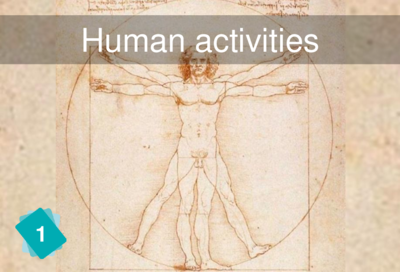En-en adult card 1 human activities: Difference between revisions
Jump to navigation
Jump to search
No edit summary |
(Structure change) |
||
| (19 intermediate revisions by 2 users not shown) | |||
| Line 1: | Line 1: | ||
==Card #1: Human Activities== | |||
<center> | |||
[[File:En-en adult card 1 front.png|400px]] | |||
This is where it all begins… | |||
</center> | |||
== | ==Explanation== | ||
This is where it all begins... This is also where 5<sup>th</sup> IPCC report begins. In the foreword of the report, it is stated that ''"the IPCC is now 95 percent certain that human beings are the main cause of current global warming"''.<ref>IPCC, 2014: Climate Change 2014: Synthesis Report. Contribution of Working Groups I, II and III to the Fifth Assessment Report of the Intergovernmental Panel on Climate Change [Core Writing Team, R.K. Pachauri and L.A. Meyer (eds.)]. IPCC, Geneva, Switzerland, 151 pp. [https://archive.ipcc.ch/pdf/assessment-report/ar5/syr/AR5_SYR_FINAL_Front_matters.pdf Foreword]</ref> | |||
This card can be considered: | |||
* [[ | *either as the '''cause''' of all the economic sector cards ([[En-en_adult_card_2_industry|Industry]], [[En-en_adult_card_3_building|Building Usage]], [[En-en_adult_card_4_transportation|Transportation]], [[En-en_adult_card_8_agriculture|Agriculture]]), | ||
*or as a '''heading''' for these cards (in which case they can be grouped together and circled). | |||
== | ==Correction== | ||
===Consequences=== | |||
*[[En-en adult card 2 industry|Industry]] accounts for 40% of greenhouse gas (GHG) emissions | |||
*[[En-en adult card 3 building|Building usage]] accounts for 20% of GHG emissions | |||
* [[En-en adult card 4 transportation|Transportation]] accounts for 15% of GHG emissions | |||
*[[En-en adult card 8 agriculture|Agriculture]] accounts for 25% of GHGs if we include induced deforestation. | |||
==Other possible links== | |||
===Other causes=== | |||
*[[En-en_adult_card_5_fossil_fuels|Fossil Fuels]] One can wonder whether human activities use fossil fuels or fossil fuels enable human activities. Do not waste time on this debate and put these two cards together if necessary. When I sing in my garden, I carry out a human activity without fossil fuels. When windmills or water mills produced flour, they did not use fossil fuels. Luckily, there are still many human activities that do not use fossil fuels. | |||
* [[En-en_adult_card_40_armed_conflicts|Armed Conflicts]] This is the Club of Rome feedback loop! The system will eventually regulate itself, but not necessarily gently. Players often make this connection and sometimes even suggest rolling up the Fresk to connect the beginning and the end. Moreover it is interesting notice that humankind appears in the first and last cards, but not in the middle. | |||
===Other consequences=== | |||
*[[En-en_adult_card_6_deforestation|Deforestation]] Deforestation can be considered either as a human activity, or as a consequence of agriculture, or both. | |||
*[[En-en_adult_card_25_terrestrial_biodiversity|Terrestrial Biodiversity]] Humans occupy almost all available space on Earth, leaving no room for animals and plants. This entails the disappearance of natural habitats and it is the main cause of biodiversity loss today, well ahead of climate change. | |||
*[[En-en_adult_card_27_marine_biodiversity|Marine Biodiversity]] With this link, we highlight all the degradations that humans are inflicting on marine life such as plastic pollution and overfishing. It's irrelevant to climate change, but it's interesting to make the connection anyway. | |||
==References== | |||
<references /> | <references /> | ||
[[fr:Fr-fr_adulte_carte_1_activités_humaines]] | [[fr:Fr-fr_adulte_carte_1_activités_humaines]] | ||
Latest revision as of 14:22, 30 October 2021
Card #1: Human Activities
This is where it all begins…
Explanation
This is where it all begins... This is also where 5th IPCC report begins. In the foreword of the report, it is stated that "the IPCC is now 95 percent certain that human beings are the main cause of current global warming".[1]
This card can be considered:
- either as the cause of all the economic sector cards (Industry, Building Usage, Transportation, Agriculture),
- or as a heading for these cards (in which case they can be grouped together and circled).
Correction
Consequences
- Industry accounts for 40% of greenhouse gas (GHG) emissions
- Building usage accounts for 20% of GHG emissions
- Transportation accounts for 15% of GHG emissions
- Agriculture accounts for 25% of GHGs if we include induced deforestation.
Other possible links
Other causes
- Fossil Fuels One can wonder whether human activities use fossil fuels or fossil fuels enable human activities. Do not waste time on this debate and put these two cards together if necessary. When I sing in my garden, I carry out a human activity without fossil fuels. When windmills or water mills produced flour, they did not use fossil fuels. Luckily, there are still many human activities that do not use fossil fuels.
- Armed Conflicts This is the Club of Rome feedback loop! The system will eventually regulate itself, but not necessarily gently. Players often make this connection and sometimes even suggest rolling up the Fresk to connect the beginning and the end. Moreover it is interesting notice that humankind appears in the first and last cards, but not in the middle.
Other consequences
- Deforestation Deforestation can be considered either as a human activity, or as a consequence of agriculture, or both.
- Terrestrial Biodiversity Humans occupy almost all available space on Earth, leaving no room for animals and plants. This entails the disappearance of natural habitats and it is the main cause of biodiversity loss today, well ahead of climate change.
- Marine Biodiversity With this link, we highlight all the degradations that humans are inflicting on marine life such as plastic pollution and overfishing. It's irrelevant to climate change, but it's interesting to make the connection anyway.
